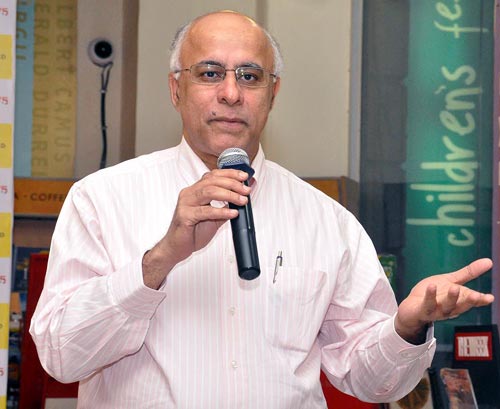 | « Back to article | Print this article |
Subroto Bagchi: B-schools never produce an entrepreneur
Young Indians must preserve our intellectual legacy and strive towards creating an India where jobs will provide hope and security, feels bestselling author and founder of MindTree, Subroto Bagchi.
If something touches you, it pays to know about it!' By that, Subroto Bagchi meant that if a certain business touches your life every day, you must at least be aware of it.
"From the toothbrush you use to the mattress you sleep on, business touches your life in some way or the other. Wouldn't it be interesting to know about the people behind it, how they began, the problems they faced and how they overcame that?"
At the launch of his new book MBA at 16, at Crossword, Kemps Corner, Mumbai, the bestselling author and founder of MindTree did precisely that.
He interacted with young readers, parents and working professionals to understand what they knew about business and fielded some interesting queries in an attempt to bring them closer to the world of business.
"I have an interesting plan, but how do I know if I can start a business?" asked a student of neuroscience from Mumbai.
"You will come to know. The idea will make you so restless that one day, you will wake up and realise that you are willing to go that extra mile and do everything it takes to make it happen," he asserted.
Standing at the Cafe Coffee Day outlet and addressing book lovers, Bagchi reminded everyone how its founder VG Siddhartha had started his career as a management trainee at Morgan Stanley before he came to be known as the founder of India's largest retail restaurant chain.
"Entrepreneurs are those who look for opportunities while others are busy looking at constraints," he explained.
When asked why the title MBA at 16, he said, "Sixteen is a nice number. No matter how old we grow, we all wish we were 16. Because that is the age when children love to explore; they ask difficult questions and make important decisions in life."
When a teacher asked why he chose to write a book and not become a teacher instead, Bagchi replied, "Every entrepreneur has a teacher inside him/her. Entrepreneurs impact the lives of many in the present and will continue to inspire several lives in the future through their actions, values and ethics. At the same time, we must understand that not everyone can talk or communicate through words, so, we need entrepreneurs to write books that will become tomorrow's legacy. We want to pass this intellectual legacy to the next generation."
Bagchi who has already authored books like Go Kiss The World and The High Performance Entrepreneur and The Professional feels that entrepreneurs are not products of b-schools and that the purpose of b-schools has been to create job seekers not creators.
In a freewheeling chat with rediff.com before the launch, Subroto Bagchi discussed the challenges facing education system today, why it is important for teenagers to have a conversation with their parents and how failure teaches you to be a better professional. Read on
Please click NEXT to continue reading
'Moral bankruptcy is a major challenge confronting young graduates today'
In your views, what are the challenges confronting the education system today?
Today's society has trivialised the system of education and neglected its purpose. When the minimum requirement to enter an engineering college is 45 per cent, it is unfair on our part to have unrealistic expectations from colleges that entertain such students. The results are for everyone to see -- unemployability, poor performance, lack of vision et all
AICTE has approved thousands of colleges to provide technical education. But what are they actually doing? These students spend four years in education and pay heavy fees and in the end become unemployable because they are not trained for the professional environment.
What are the challenges awaiting the batch of 2012- professional and emotional?
Moral bankruptcy is a major challenge confronting young graduates today. We must create values, and preserve them, not just chase jobs.
While saying that, I would like to acquaint my young friends about the concept of legacy.
Each generation is committed to a legacy.
The generation before mine fought for political legacy -- for freedom of leadership. It took them a century to get there.
Our generation fought for financial legacy -- for better business relations, entrepreneurship, financial freedom, better policies etc. While we have somewhat succeeded, we can say we have set some examples in the form of JRD Tata, Narayan Murthy and the like to let the youngsters take over.
The current generation has a bigger responsibility, and a more important legacy to pursue though. Intellectual Legacy!
Right from books we read to the music we listen and the films we've watched, India has made a major contribution to this legacy over the years and it is time we protect and safeguard this legacy and pass it on to the next generation. We need people who will talk and write about our legacy as it is happening so that we can share it with the future.
Do you think the b-schools in our country have been able to produce good entrepreneurs?
In my opinion, b-schools never produce an entrepreneur. It is the person's ability and passion towards a purpose that brings out the entrepreneur in him/her.
B-schools produce job-seekers. If you remember, the Indian Institutes of Management were set up in the country with the same purpose -- to create better managers, not entrepreneurs. Entrepreneurs are not children of a b-school.
They are born out of social needs and expectations. Anybody can start a company today; you don't need an MBA for that.
To be a good entrepreneur, you need to be obsessed by an idea; then be consumed by its passion so much that you will take everything in your stride and make it happen.
Illustration: Dominic Xavier
'India needs young entrepreneurs who will create jobs'
A majority of students pursue MBA to get better placements. Your views
Not all those who study MBA become entrepreneurs. The course of MBA was designed to teach you qualities of leadership and management. To some, it gives a deeper understanding into the world of business and how enterprises are run. But if the purpose of MBA is to seek jobs, I think we need to think beyond. India needs young entrepreneurs who will create jobs.
Your advice to students who don't make it to the top B-schools...
I did not attend school till the age of eight because there were no good schools in the place where I lived. I never went to a b-school. But I am a reasonably successful entrepreneur today.
Similarly, there are so many successful people around us who never went to school who have been there and done that. It is a perception that people have created and lived by -- that you have to be an MBA to be something in life. That's not true.
We are all here to create values. That's what b-schools do. You can do that even as a student or a working professional. You just have to learn to be good at what you do. And always strive to be the best!
Your advice to youngsters graduating/ starting out on professional life this year
I would like to tell them that there is an interesting world waiting to be explored. At the same time, do not explore it alone. Explore it with your friends to understand the beauty of it, to see it in various perspectives.
Your generation has the infinite power of social media. You have no clue how many people you can influence with your ideas.
Most importantly, your parents know a lot about the world outside. They know how an organisation functions, the people involved in it, the every day challenges you may have to confront so on and so forth.
Many youngsters ignore this fact. I think it is time they had such a conversation with their parents. There is so much to listen and learn from their experience.
While it is important to learn, read and talk, it is also important to have a point of view, an opinion. But these opinions have to be informed and backed with subsequent facts and knowledge.
How important is work experience for an aspiring entrepreneur?
Work experience is very very important. I would suggest that you must for a good 5-6 years before starting your own company.
Illustration: Uttam Ghosh
'When you're confident about your idea, you will be bursting with pain and joy to deliver that idea'
Since your book MBA at 16 is targeted at teenaged adults, name a few youngsters who turned entrepreneurs between ages 14 and 21 and have inspired you.
There may be many. I can think of two at the moment. Steve Jobs was only 16 when he met Stephen Wozniak. They went on to found Apple.
Azim Premji was 21 when he took over Wipro after his father died in 1966. He had a huge responsibility and he delivered success after success. His is a crowning story of determination and grit at a young age. Very inspiring!
When will you know that it's the right time to start a company?
There is no right time, but you will come to know.
Let me share a story with you to explain this better. This story is about the birth of my friend. When his mother was pregnant, and suffered from labour pain, she rushed to a nearby hospital to deliver the child.
But when she went there, the hospital staff asked her to go to a better hospital because that particular hospital did not have the necessary facilities to help her deliver the child. But she was so full of pain that she could not wait to reach the next hospital and she delivered the baby on the street.
That's exactly how entrepreneurs are born. Entrepreneurs are not those who are waiting for things to happen. They make things happen.
When you are confident about your idea, you will be bursting with pain and joy to deliver that idea. That's how you will give birth to the entrepreneur inside you.
What are the skills that youngsters should develop before starting their own venture?
While each one must try and pursue higher education, youngsters must also try and develop interdisciplinary skills.
You must interact more often with people from various professions and sectors to understand how different enterprises run and operate.
If you are already working for a company, explore the world outside your company. Look what others are doing differently.
You must develop survival skills, have a broad understanding of entrepreneurial concepts and have the knack of identifying and following trends.
Illustration: Dominic Xavier
"Sir, can you do business without being corrupt?"
In your observation, what are the common reasons you would attribute to the failure of most start-ups?
I was 30 when I started my first company. I had 11 years of experience, but that was not enough. After three years, I had to shut shop and look for another job. I worked for another 11 years and started MindTree at 42.
I think the most common mistake that most entrepreneurs make is they underestimate the power of selling. You may have a great idea, a great business model, but the challenge is: Is it tempting enough that the customer will part with his money and buy your idea?
When we started MindTree, we made a 29-page business plan which we presented to our investors. It's been 13 years since we started that journey and a few years ago, I felt this urge to open that file and understand what we had achieved -- what we had done right and where we had gone wrong.
On the first page of that document, we had enlisted that we will be a 100$ million company by 2005. We had achieved that. On the last page, we had enlisted 22 risks that the company might face during the course of operations. Interestingly, all the 22 risks had come true. We had faced recession, terrorism, and survived all that too! It did not matter what was written in the pages between 2 and 28.
As an entrepreneur it is important to calculate risks and be flexible to adapt your plans to survive the situation. You may be expecting a forest, but you may get stuck in the snow. You have to be quick enough to change your business plan to survive in the new environment. Will you open an ice-cream stall or a woollens store? You must have plans B, C, D and may be even Z. And you may have to act immediately.
When I was writing MBA at 16, a teenager asked me 'Sir, can you do business without being corrupt?' I did not have an answer. There are some things that you learn along the way. There is nothing right or wrong, good or bad in business. Each one brings their own experience and lessons to the table.
Like, there are many young students who do not realise that even education is a business. The fees you pay, the books you buy are all part of the revenue it generates each year. To understand a business, you have to work as a part of the business and then alienate yourself from the business and look at it as an outsider. You must understand how your business is perceived by a buyer as against a seller.
Tips for young entrepreneurs
You must know your customer well. If you want to be an entrepreneur in future, you must start today. Try working as a salesman because he is the one who is the closest to the buyer.
Do not start a business unless you are obsessed by the idea.
A successful business should have three goals -- must generate revenue, should be able to grow within and transform into something new and better, must give something back to society.
When everyone else is looking at constraints, an entrepreneur is the one who looks at opportunities. That should be your attitude.
What career advice would you like to offer to the class of 2012
In your hands, lies the force that will build the future of this nation. You cannot be chasing jobs all your life. If you look at the successful companies, their larger aim is to cut jobs to enable efficiency. It is start-ups that hire young talent.
As you grow in your career, you must not only strive to create jobs but also build under your leadership a secure and stable work environment for your employees. You must give them the hope -- to take a loan, to buy a house, to fund a child's education, to lead a family.
Illustration: Uttam Ghosh




